The Intel Core i9-9900K at 95W: Fixing The Power for SFF
by Ian Cutress on November 29, 2018 8:00 AM ESTCPU Performance: Encoding Tests
With the rise of streaming, vlogs, and video content as a whole, encoding and transcoding tests are becoming ever more important. Not only are more home users and gamers needing to convert video files into something more manageable, for streaming or archival purposes, but the servers that manage the output also manage around data and log files with compression and decompression. Our encoding tasks are focused around these important scenarios, with input from the community for the best implementation of real-world testing.
All of our benchmark results can also be found in our benchmark engine, Bench.
Handbrake 1.1.0: Streaming and Archival Video Transcoding
A popular open source tool, Handbrake is the anything-to-anything video conversion software that a number of people use as a reference point. The danger is always on version numbers and optimization, for example the latest versions of the software can take advantage of AVX-512 and OpenCL to accelerate certain types of transcoding and algorithms. The version we use here is a pure CPU play, with common transcoding variations.
We have split Handbrake up into several tests, using a Logitech C920 1080p60 native webcam recording (essentially a streamer recording), and convert them into two types of streaming formats and one for archival. The output settings used are:
- 720p60 at 6000 kbps constant bit rate, fast setting, high profile
- 1080p60 at 3500 kbps constant bit rate, faster setting, main profile
- 1080p60 HEVC at 3500 kbps variable bit rate, fast setting, main profile
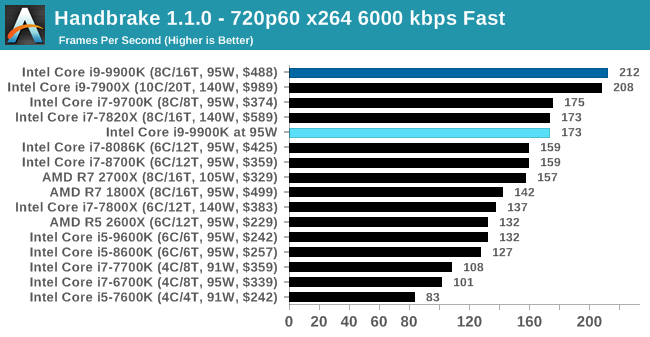
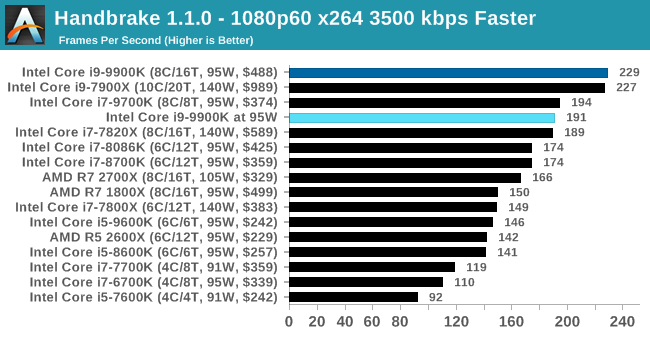
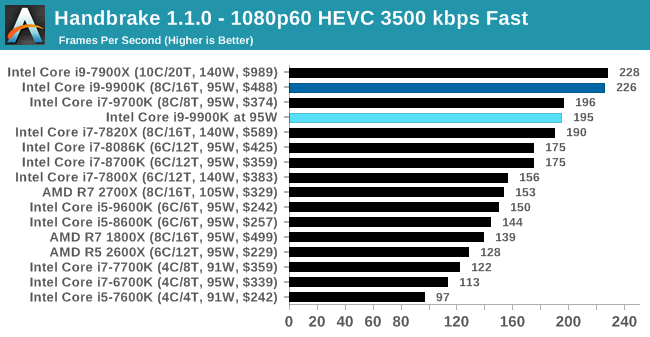
Encoding is a good example where the performance decreases by a noticable margin (10%+), although perhaps not as much as you might think. In all of our tests however, the 95W mode again pulls the 9900K down to the level of a 9700K. This pattern goes through all of our encoding tests.
7-zip v1805: Popular Open-Source Encoding Engine
Out of our compression/decompression tool tests, 7-zip is the most requested and comes with a built-in benchmark. For our test suite, we’ve pulled the latest version of the software and we run the benchmark from the command line, reporting the compression, decompression, and a combined score.
It is noted in this benchmark that the latest multi-die processors have very bi-modal performance between compression and decompression, performing well in one and badly in the other. There are also discussions around how the Windows Scheduler is implementing every thread. As we get more results, it will be interesting to see how this plays out.
Please note, if you plan to share out the Compression graph, please include the Decompression one. Otherwise you’re only presenting half a picture.
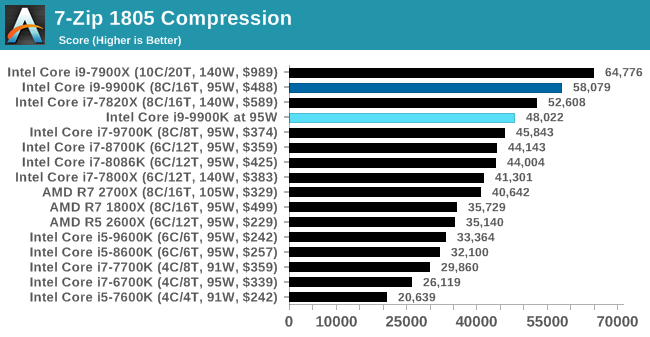
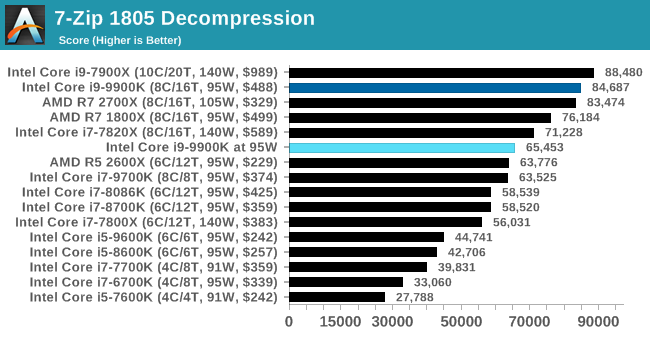
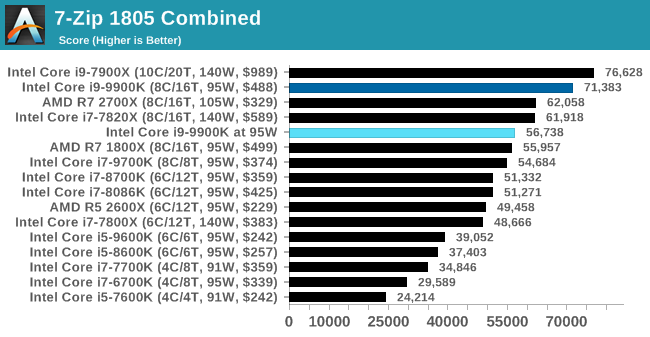
WinRAR 5.60b3: Archiving Tool
My compression tool of choice is often WinRAR, having been one of the first tools a number of my generation used over two decades ago. The interface has not changed much, although the integration with Windows right click commands is always a plus. It has no in-built test, so we run a compression over a set directory containing over thirty 60-second video files and 2000 small web-based files at a normal compression rate.
WinRAR is variable threaded but also susceptible to caching, so in our test we run it 10 times and take the average of the last five, leaving the test purely for raw CPU compute performance.
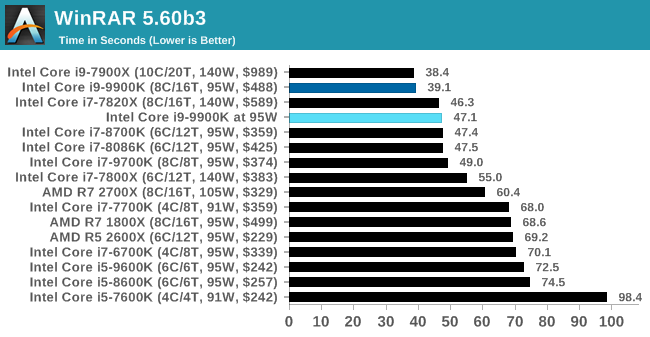
AES Encryption: File Security
A number of platforms, particularly mobile devices, are now offering encryption by default with file systems in order to protect the contents. Windows based devices have these options as well, often applied by BitLocker or third-party software. In our AES encryption test, we used the discontinued TrueCrypt for its built-in benchmark, which tests several encryption algorithms directly in memory.
The data we take for this test is the combined AES encrypt/decrypt performance, measured in gigabytes per second. The software does use AES commands for processors that offer hardware selection, however not AVX-512.
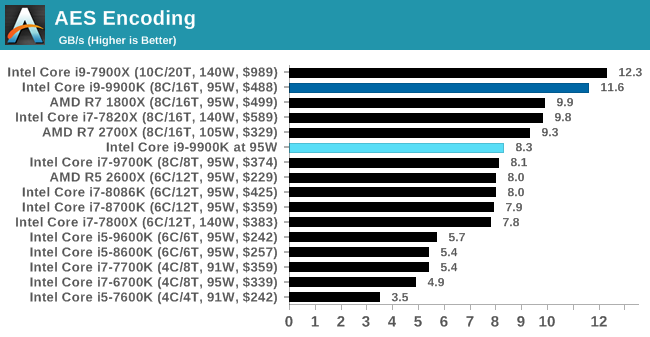










101 Comments
View All Comments
Rukur - Monday, December 3, 2018 - link
9900K comes out of the box with 5Ghz so its going to win on games. The prize it a game stopper but.woggs - Thursday, November 29, 2018 - link
"This rises to 44.2 if the processor is fixed to 95W" but there is no data point on the plot at that spot. A mouse-over labeling of that plot would be very-helpful.romrunning - Thursday, November 29, 2018 - link
I don't understand - the article title says "Fixing the Power for SFF", and yet no motherboards with the form factor typically used in SFF systems were actually tested. The motherboards listed were all ATX; no mini-ITX or even micro-STX boards were used.Why not? Wouldn't this have provided valuable insight for those looking to purchase a SFF system, custom or DIY, to see which mfgs cap the TDP usage or let it go full range?
The author said he tested a MSI Vortex G3 small form factor desktop last year. Well, why not get some comments from ASRock, Gigabyte, ASUS, and MSI as to whether it's standard practice for them to limit CPUs to a specific power limit in their BIOS for those SFF boards.
Fro example, I'd love to know if that sweet-looking ASRock DeskMini GTX Z390 that was recently reviewed can take the i9-9900k rated at 95W to the full "unlimited" power settings. I can put 450-600W SFX/SFX-L PSUs into a SFF system, so I'd like to know if I can get the full performance out of the CPU or if the mfg locks the power draw in the BIOS.
SaturnusDK - Thursday, November 29, 2018 - link
Why is this article, and Anandtech in general, using 1000 unit OEM prices for Intel products which are typically 15-20% less than the lowest retail price you can find. But use the highest you can find retail prices for AMD products? It seems like Anandtech is deliberate trying to make people think Intel products have any value when the reality is that they don't.Rezurecta - Thursday, November 29, 2018 - link
Good re-review. Although, Ian doesn't seem to want to call Intel out. This is OBVIOUSLY something initiated by Intel. If the 9900k were to run in spec it would be slower than the 2700x in a LOT of benchmarks. Intel couldn't have that for such a massive hot monolithic die. That's why all the shady sponsored benchmarks and having the processor way out of spec.It's obvious Intel is hurting. Let's hope this brings about a competitive landscape again.
kernel-panic - Thursday, November 29, 2018 - link
it would be nice if somewhere you let readers know what TDP, PL1 and PL2 mean. I enjoy this kind of articles but I'm not related with the terminology.Icehawk - Thursday, November 29, 2018 - link
It's in the (by now) linked article at the very beginningMr Perfect - Thursday, November 29, 2018 - link
How do motherboards treat the non-k versions of these CPUs? When I built my mITX machine, I bought the non-K processor since there wouldn't be any overclocking going on. Just how locked is a locked CPU? Technically, this could be considered turboing ratehr then overclocking and could be applied to the non-Ks.Targon - Sunday, December 2, 2018 - link
It is possible that Intel won't release a non-k version of these chips, just because there won't be a significant enough performance benefit vs. the AMD 2700X if the chips were not being pushed to their absolute limit.stux - Thursday, November 29, 2018 - link
An interesting point that you make is that a 9900K constrained to 95W performs like an unconstrained 9900K for single threaded loads and an unconstrained 9700K for multithreaded loads.The 9700K has half the threads, so that is an interesting claim, and I think the key is how does the 9700K perform when constrained to 95W.
Hyperthreading is supposed to be a big win to perf/W, thus I’d expect 9900K at 95W to be more efficient than the 9700K for the same perf, which is a definitive win too.
How does the 9700K at 95W perform in the multi threaded benchmarks?